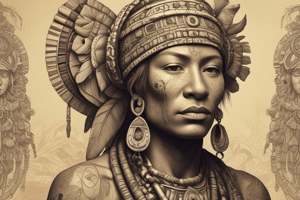Podcast
Questions and Answers
Which of the following best defines cultural anthropology?
Which of the following best defines cultural anthropology?
- The biological study of humans and their origins
- Exploration of patterns in beliefs and practices of societies (correct)
- The analysis of language and its cultural significance
- The study of human cultures through artifacts
Ethnocentrism promotes the understanding of cultures in their own context.
Ethnocentrism promotes the understanding of cultures in their own context.
False (B)
What is the primary method used in anthropological fieldwork?
What is the primary method used in anthropological fieldwork?
Participant observation
___ anthropology investigates and reconstructs the evolutionary origins of humans.
___ anthropology investigates and reconstructs the evolutionary origins of humans.
Match the following anthropological subfields with their focus:
Match the following anthropological subfields with their focus:
Which perspective is defined as understanding a culture through immersion?
Which perspective is defined as understanding a culture through immersion?
The etic perspective allows for understanding a culture from the viewpoint of a member of that culture.
The etic perspective allows for understanding a culture from the viewpoint of a member of that culture.
What are the two locations mentioned for the performance task on writing a mini-ethnography?
What are the two locations mentioned for the performance task on writing a mini-ethnography?
The performance task involves observing people's __________ behaviors in various locations.
The performance task involves observing people's __________ behaviors in various locations.
Match the following concepts with their descriptions:
Match the following concepts with their descriptions:
Flashcards are hidden until you start studying
Study Notes
Learning Objectives
- Define anthropology as a comprehensive study of humans, including origins and all aspects of existence.
- Understand the rationale behind studying anthropology to gain insights into human behavior.
- Apply anthropological perspectives to analyze cultures and societies.
What is Anthropology?
- A fusion of social and natural sciences that provides insights into human behavior.
- Explores the complexities of human existence, including cultural, biological, and historical dimensions.
Physical Anthropology
- Focuses on humans from a biological standpoint, investigating evolutionary origins.
- Emphasizes the interplay between biology and culture in understanding human adaptation and evolution.
Archaeology
- Examines human cultures through the study of past materials and artifacts.
- Seeks to understand how artifacts relate to contemporary and future societies.
Anthropological Linguistics
- Investigates the connection between language and culture.
- Analyzes how language influences thought and communication, playing a role in cultural transmission.
Cultural Anthropology
- Explores societal patterns, beliefs, practices, and behaviors in contemporary settings.
- Highlights the diversity of human cultures across the globe.
Fieldwork in Anthropology
- Fieldwork is essential for gathering primary data about people and cultures.
- Participant observation is a critical method for effective fieldwork.
Ethnography
- Involves recording and analyzing cultural practices through participant observation.
- Results in written accounts of individuals, communities, or institutions.
Multiculturalism
- Promotes acceptance of multiple cultural traditions within specific boundaries.
- Acknowledges the coexistence of diverse cultures in a society.
Ethnocentrism
- Refers to the tendency to evaluate other cultures through the lens of one's own culture.
- Can lead to misunderstanding and misjudgment of different cultural practices.
Cultural Relativism
- Asserts that there are no universal standards for judging cultures.
- Encourages appreciation of cultural diversity without bias.
Etic Perspective
- Involves understanding a culture from the viewpoint of outsiders.
- Focuses on comparative analysis rather than insider experience.
Emic Perspective
- Prioritizes understanding a culture through immersion and insider perspectives.
- Facilitates deeper comprehension of worldviews and lifestyles.
Performance Task: Mini-Ethnography
- Group activity consisting of four members visiting specific locations (e.g., church, art museum, daily commute).
- Involves direct observation of behaviors and practices in chosen environments.
- Encouraged to reflect on observable and repetitive behaviors of individuals in each location for analysis.
Studying That Suits You
Use AI to generate personalized quizzes and flashcards to suit your learning preferences.




